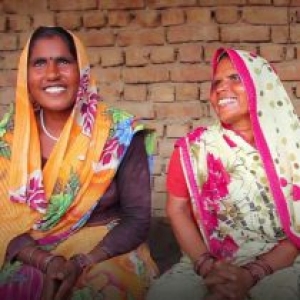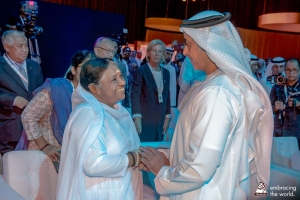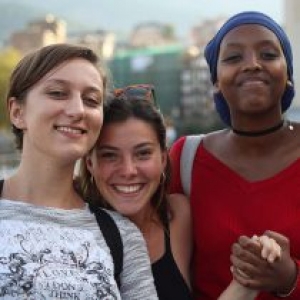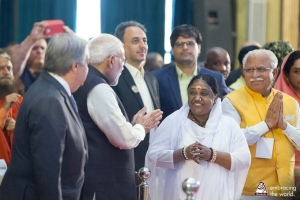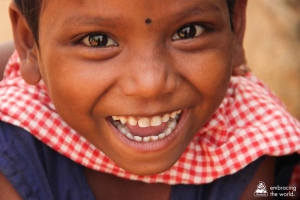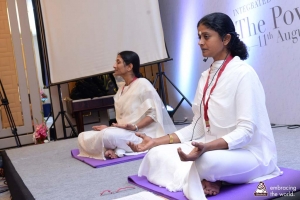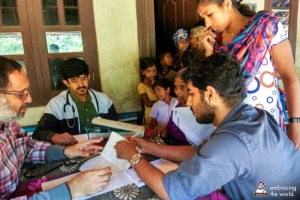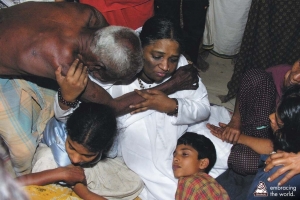Our Voices – the Women of Naglachandi
November 26, 2018 – Naglachandi, Uttar Pradesh, India
The women of Naglachandi in the Mathura district of Uttar Pradesh have much to tell about the challenges they face in their lives. All they need is ears ready to listen…. And what those ears will witness is an innate strength.
Projects in this village and many others across India have begun a movement of independence for these communities. Amrita SeRVe is working to bring self-reliance to 101 villages.
Amma addresses Abu Dhabi Interfaith Summit to protect children online
November 20, 2018 - Abu Dhabi, United Arab Emirates
Interfaith leaders from around the world gathered in the United Arab Emirates for a Call to Action to protect children from abuse online. Amma was one of six senior faith leaders to pledge support for the Abu Dhabi Interfaith Declaration for Child Protection.
Amma also gave the opening address to the 450 people who attended, which included faith leaders of all major religions and NGO representatives. The event coincided with the United Nations’ Universal Children’s Day.
AYUDH forges a new path for the world’s future
November 13, 2018 – Europe
Thirty youth activists from six different countries have decided to become changemakers for our planet’s future. They have completed AYUDH Europe’s first year-long training course on Social Impact Leadership.
The participants were from the ages of 18 to 30 and came from Denmark, Greece, France, Spain, the Netherlands and Germany.
The Prime Minister honors Amma for contributing to the campaign to clean up India
October 3, 2018 – Delhi, India
The Honorable Prime Minister of India, Narendra Modi, and the UN Secretary-General, Mr. António Guterres, presented Amma with a special award at a prestigious gathering in Delhi yesterday.
The honor is in recognition for having made the largest financial contribution to Swacch Bharat Abhiyan, the most significant cleanliness campaign by the Government of India. The campaign started four years ago, and Embracing the World contributed Rs. 100 crore (currently $14 million US) to build toilets for the poor living along the banks of the Ganges River.
Empowering India’s tribal people through education
October 15, 2018 – Kollam, India
The Government of India has recognised Amrita Vishwa Vidyapeetham’s significant work to uplift India’s tribal people in the fields of education, health and e-literacy. The Ministry of Tribal Affairs has given the university the title of ‘Centre of Excellence in Tribal Empowerment through Digital Inclusion’.
The ministry also highlighted the distinctive work that has led to the fulfilment of United Nation’s Sustainable Development Goals through its 101 adopted Amrita SeRVe villages.
Meditation can bring a positive focus to our world’s leaders
October 23, 2018 - Pune, India
“Meditation is a powerful remedy for these turbulent times,” said Mr. Vijay K. Nambiar, former UN Secretary-General Special Advisor on Myanmar and also Chef de Cabinet under former UN Secretary-General Ban Ki-moon. He encouraged leaders of various institutions to use meditation to succeed in today’s competitive and changing world.
Mr. Nambiar was the keynote speaker at our ‘Power of IAM Leaders Conclave’ that took place in Pune, Maharashtra. The path-breaking event brought together director level executives from government institutions, senior decision makers, opinion formers, business leaders of Indian and multinational companies, as well as top professionals from education, culture, arts, health, sports and media. The focus was to inspire and create a catalyst for the exchange of fresh thinking and partnerships.
As flood waters recede, people return home in Kerala
August 23, 2018 - Kerala, India
“I saw thousands of families, with the same insecure feelings as me, sharing their losses,” explains Sreeni KR. Sreeni works with Amrita SeRVe, our village development project.
“In the camp I have seen the rich and the poor, the goldsmith and the blacksmith, the landowner and the laborer all together. Sharing the same food, shelter and clothes. I have watched the Christian brothers preparing food and serving it to Hindu and Muslim families. This is the beauty of India.”
Sreeni was on a train from Mumbai when the flood waters hit his home in Poolani, Meloor. It’s a small community of 2,500 families, about 75 kilometers north of Kerala’s largest city of Kochi and about 50 kilometers inland from the Arabian Sea.
While Sreeni travelled, he learned flood waters were reaching 15 meters and people were panicking and running to relief camps. But he could not reach his wife, daughter or other family members for many hours. Unimaginable stress.
Sreeni had to stop his travels at the nearest train station in the city of Coimbatore due to flooded roads. He finally got a hold of his family on the phone. They were alright. It took them two days to find shelter in a relief camp, and it took Sreeni another two days to be able to join them.
When Sreeni arrived at the camp of 4,000 displaced people, he was grateful to see members of various political parties, doctors, medical teams, and police all joining together to manage it very well. Most of the evacuees didn’t even have a change of dress. But the camp was able to provide sufficient food, supplies and clothes.
“When I reached the house the next morning and opened the door, the situation was more horrible than I had thought. Almost everything destroyed. The room is filled with silt, mud, tree branches, leaves and many types of snakes,” describes Sreeni.
“We will have to clean many more times before we move back in. All the wells are overflowing with plastic bottles and waste. We have a shortage of drinking water and food supplies. The loss is unbelievable. What my parents earned and saved over the last sixty years was all gone within seconds. But thank God for no human casualty and we are left with four structured walls and a roof.”
Sreeni’s situtation is one that thousands of people across Kerala will deal with over the coming days. As flood waters recede, it is now time to assess overall damages and begin cleanup and restoration.
More than 380 people have been counted in the death toll so far and about 1,100,000 people have been displaced from their homes and sheltered in more than 5,600 relief camps that run in schools, colleges, churches, madrassas and convention halls. The work includes the task of enforcing cleanliness to prevent water-borne illnesses such as typhoid, cholera and hepatitis-A. Buildings, infrastructure and farmlands across the state lay in ruin.
Embracing the World volunteers continue to take part in the efforts. Relief camps in 30 of our 40 Amrita Vidyalayam schools remain in operation, and teams have already begun to disperse into communities to help with initial cleanup. Donations of food, water and essential supplies are being sorted and sent to those in need.
In fact, a tremendous donation of medical supplies arrived with the MA Center in San Ramon, California, US. Volunteers are gathering to sort, count and pack the items for shipment to India.
Despite the fact the flood waters hit the ground floor at Amrita Institute of Medical Sciences and Research (Amrita Hospital), they were cleared within a day and vital treatment remained without interruption. The remote medical units that have been traveling to isolated areas since the outset of the floods also continue their work.
The AYUDH Amritapuri 24-hour emergency call center at Amrita Vishwa Vidyapeetham has received 25,000 calls that led to the rescue and aid of more than 100,000 people. The calls were confirmed by volunteers and then sent to the multi-faceted rescue teams of government officials, Navy, Air Force, Coast Guard, National Disaster Response Force, Army, the police, local fishermen and other volunteering agencies. The center remains in operation. In fact, a team at Amrita Center for Wireless Networks & Applications developed a specialized app to manage the distress calls.
“I can speak for all of the volunteers when I say that we are ecstatic to be able to help in this small way,” said AYUDH Coordinator Amritesh. “We got a lot of positive feedback from the Indian Air Force and Navy, telling us that the information collected through the Amrita Helpline has helped them to better target their rescue and relief operations and to follow through with greater speed.”
As flood evaluation evolves, restructuring teams for overall community rebuilding now prepare for the long journey ahead.
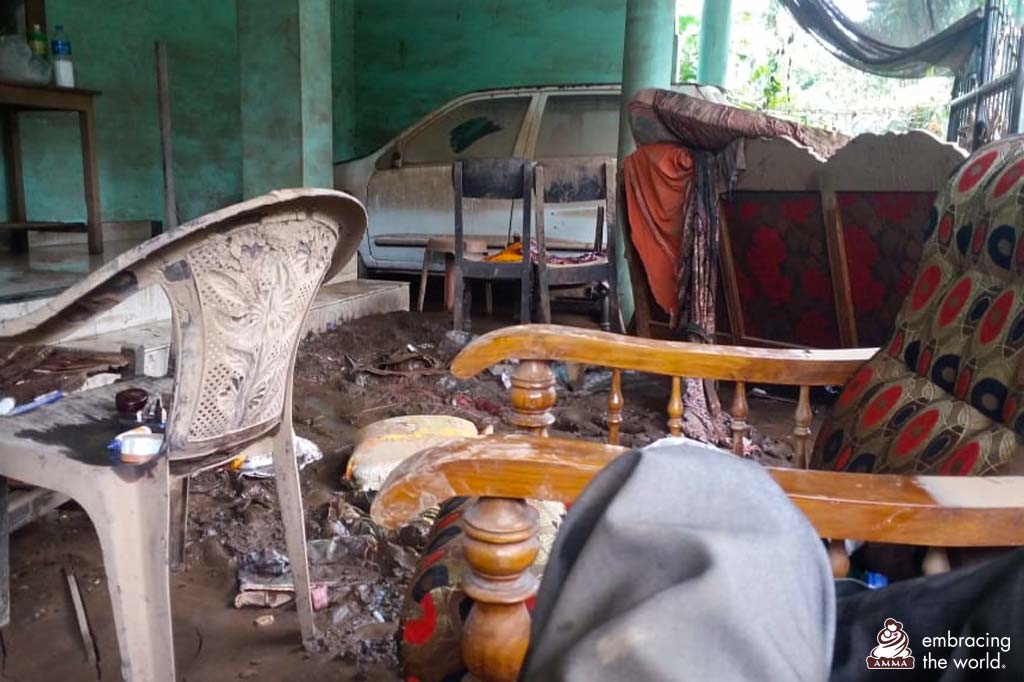
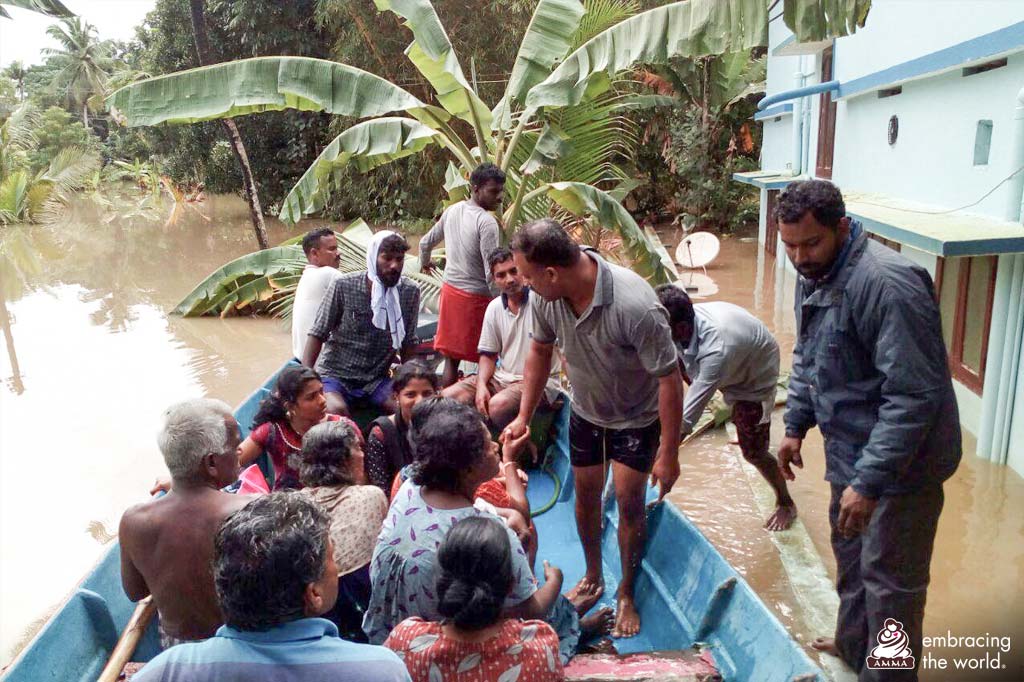
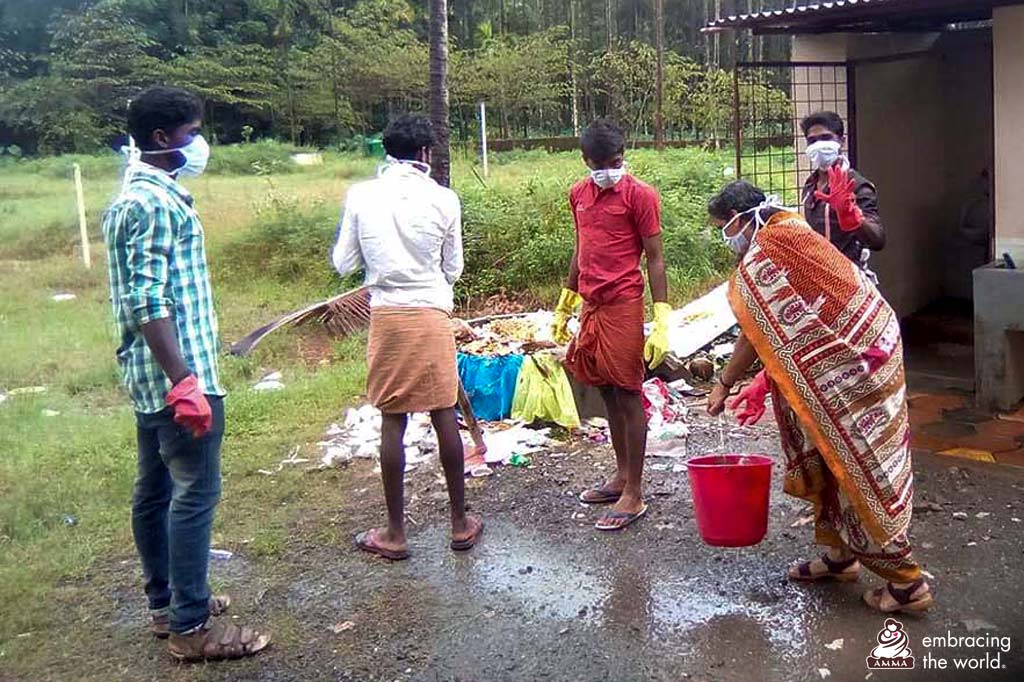
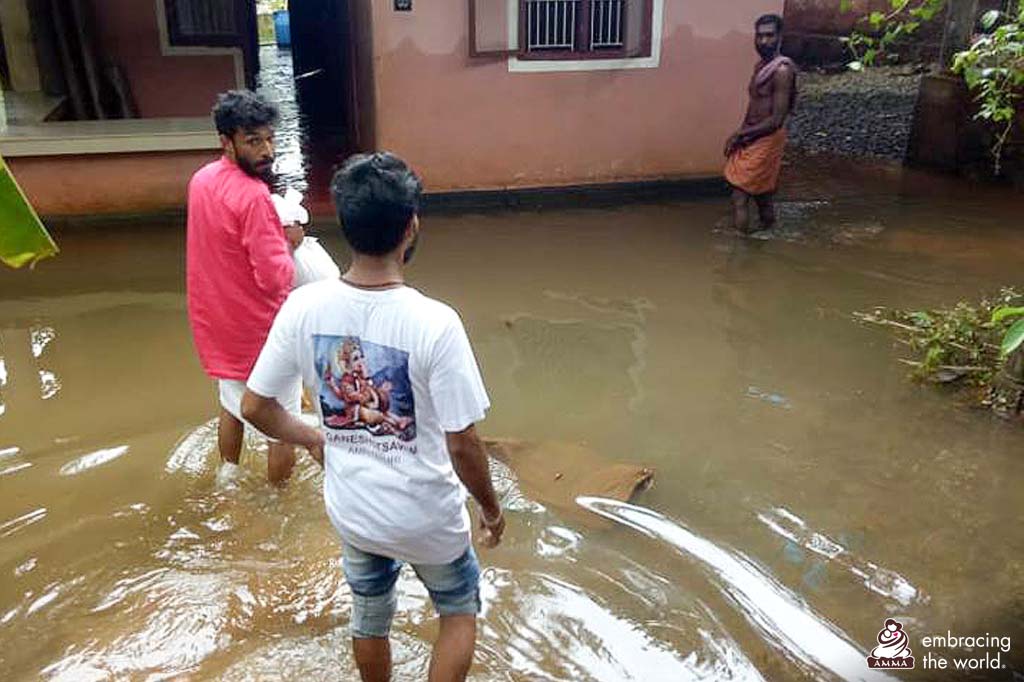
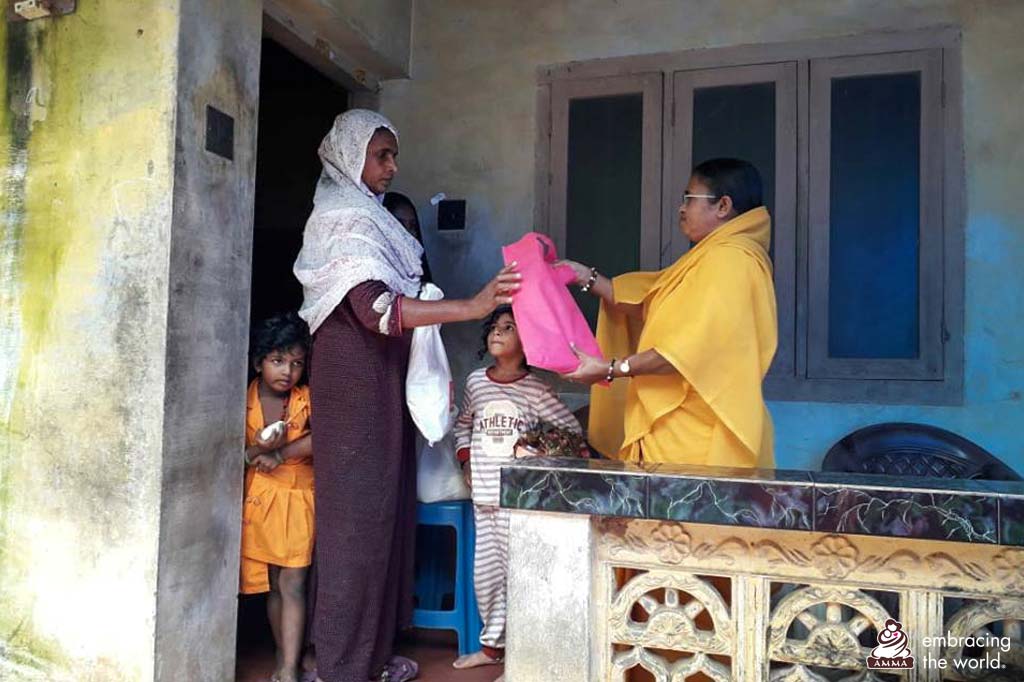
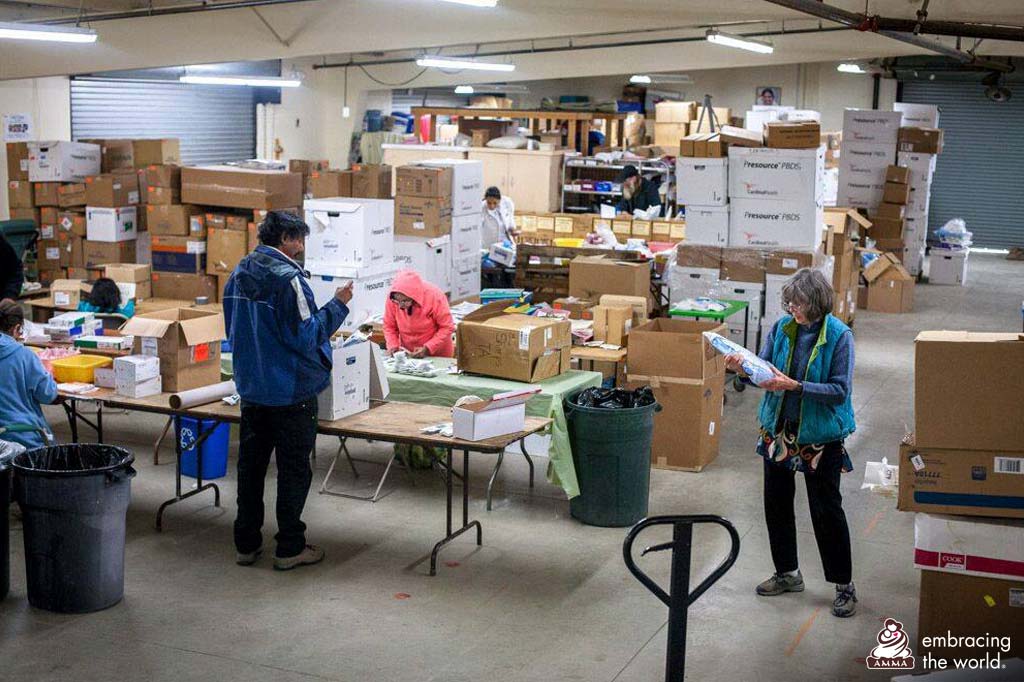
Answering a call–university students started a helpline to save lives in the Kerala floods
August 27, 2018 - Kollam, Kerala, India
During the Kerala floods, students and faculty at Amrita Vishwa Vidyapeetham’s Amritapuri Campus were desperate to think of some way to help the hundreds of thousands of flood victims throughout the state.
They had already set up donation centers for clothing, food and other care supplies. They had also already made plans to start travelling to affected communities to begin cleanup when waters receded. But it didn’t feel like enough.
Then the idea came to them, “What if we could set up a call centre to help rescue the stranded?” And so at the university on August 16th at 1:00 p.m., enough people came together and enough technology was set up to begin Amrita Helpline̶--a 24-hour call-in rescue center.
Within five days, the team had fielded more than 25,000 calls and connected over 100,000 flood victims with the appropriate relief services. This included government officials, Navy, Air Force, National Disaster Response Force, Kerala State Police, local fishermen and other volunteering agencies.
For example, the helpline received a call from a woman who desperately explained that her elderly mother was clinging to her back, while she held a baby in her arms above the rising waters.
The call center volunteers reached out to a nearby fishing boat and within ten minutes, the woman, her mother and child were all saved. Learning of her rescue, the woman’s husband, in gratitude, sent truckloads of relief supplies back to Embracing the World to distribute to those still in need.
The helpline also received a call from a man asking for help as he was stranded in his home. They sent a fishing boat to the area, where the fishermen discovered an elderly couple inside a neighboring house, up to their neck in floodwaters. The couple was astonished to see the fishermen come to save them.
“We couldn’t call,” the couple explained. “We don’t own a mobile phone. As the waters rose, all we could do was pray for someone to rescue us.”
“I can speak for all of the volunteers when I say that we were ecstatic to be able to help in this small way,” said A.R. Amritesh. Amritesh is the coordinator for AYUDH Amritapuri. AYUDH is Embracing the World’s youth chapter and they played a central role in running the helpline.
“We got a lot of positive feedback from the Indian Air Force and Navy, telling us that the information collected through the Amrita Helpline helped them to better target their rescue and relief operations and to follow through with greater speed.”
The helpline team ultimately consisted of more than 400 students and faculty who broke their days up into three different shifts for five days straight. When a call came into the helpline, 20 phones in parallel servicing were continuously answered.
“I can say with confidence that we fielded every single call that came in,” said Amritesh. “Each of the student volunteers would ensure the caller’s information was passed on to the relevant rescue teams. They would then follow through until the stranded persons were secured to safety.”
Not only did the volunteers work the phone lines, they also fielded help requests via the internet and social media. They used special techniques to identify and verify information about locations, routes, relief agencies, volunteers and suppliers. They then conveyed this information to rescue teams to help them precisely target their operations.
This commitment made the services provided by Amrita Helpline invaluable and popular both among the public and rescue teams. The helpline also coordinated the distribution of food, clothes, medicines, and other essentials among the rescues. In addition, the volunteers were able to help give assurances to relatives of flood victims living abroad.
“There are Malayalees all over the world,” said Ramesh Azhakesan, AYUDH Core Committee Member. “The fact that we were able to field calls from the Gulf, Europe and the U.S. and help families learn the whereabouts and safety of their relatives gave thousands of people a lot of relief.”
The Amrita Helpline was a demonstration of how technology and teamwork can help during calamities through the positive use of social media. The motivation for Amrita Helpline came from the Compassionate Kerala group, an initiative by Prashanth Nair, a former collector with the Indian Administrative Service (IAS) in Calicut, Kerala.
Meanwhile, restoration and relief services for people affected by the floods continue to grow. More volunteer teams are assembling to visit locations and aid in medical treatment, essential supplies, environmental cleanup and assessment of how to rebuild damaged buildings and properties.
We are working hard to reach remote tribal communities in Kerala, as these are villages that are mostly isolated at the best of times.
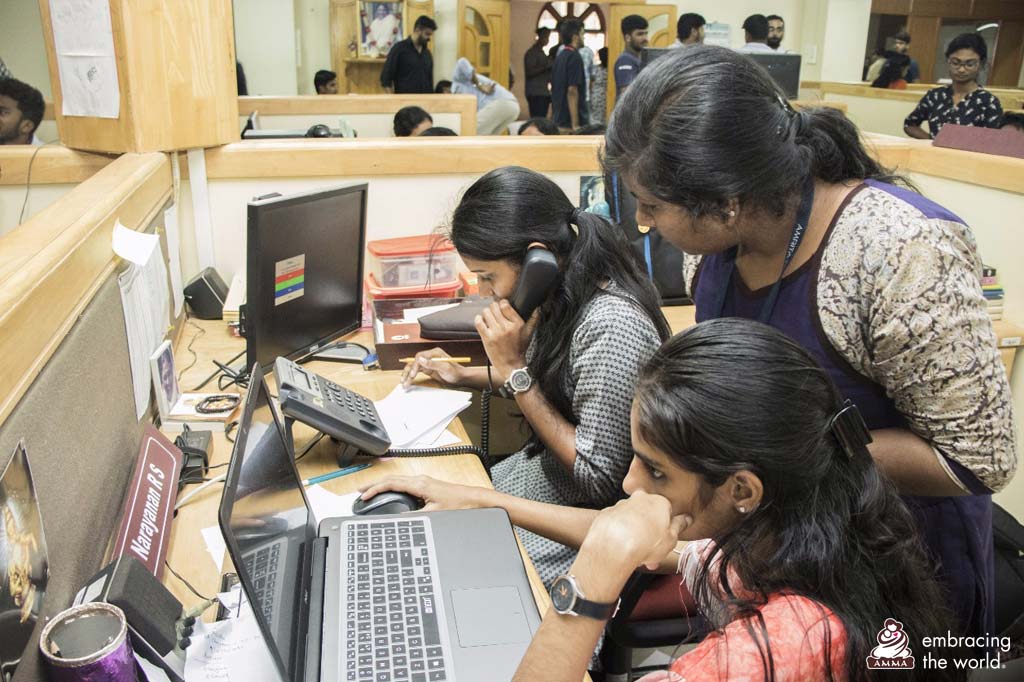
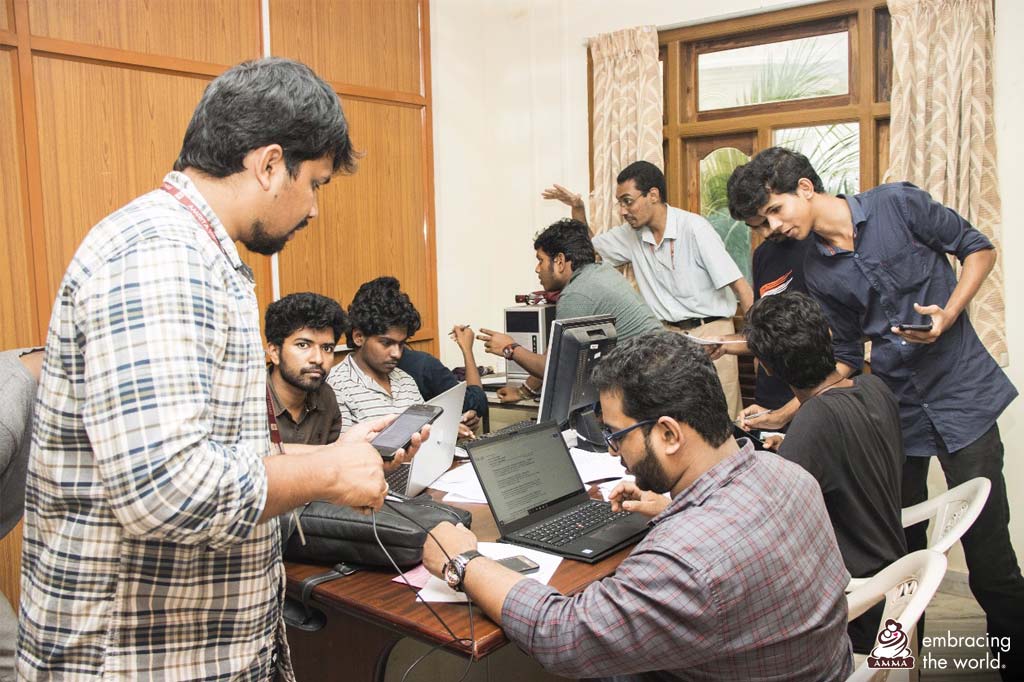
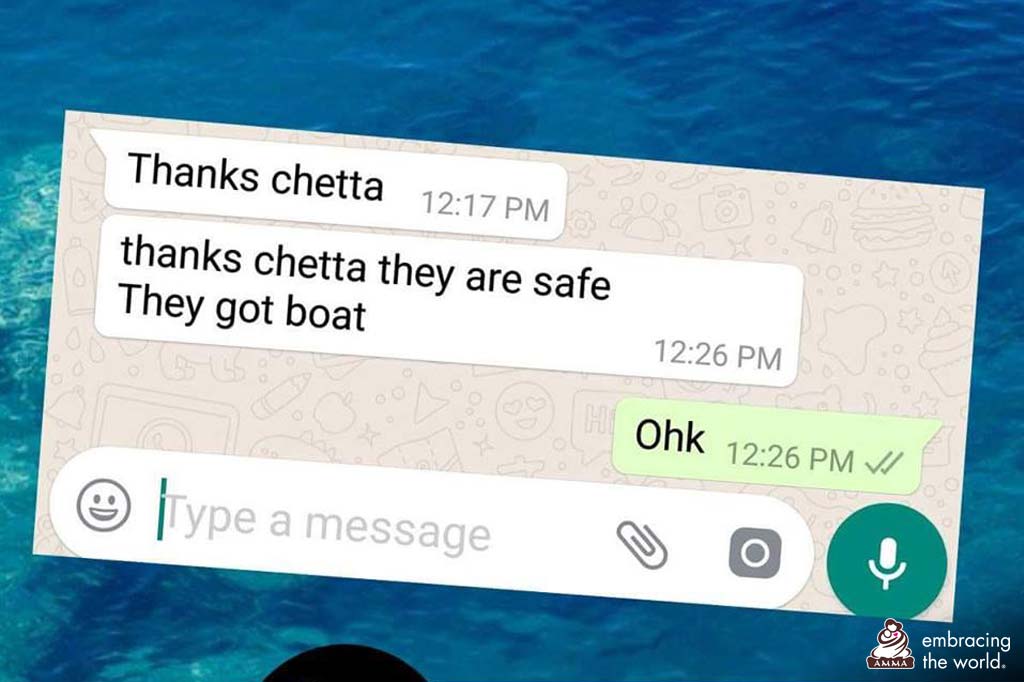
Medical camps travel to rural areas inundated by Kerala flooding
Remote medical teams from Amrita Institute of Medical Sciences & Research (Amrita Hospital) are at work to provide treatment in remote areas affected by Kerala’s floods. These places have limited access to medical care facilities and in some, the teams have had to deliver service by boat due to deep flooding.
Today all districts in Kerala remain on red alert. At least 67 deaths have happened due to rain-related incidents, with 24 taking place yesterday. As of this morning, 20 more people are feared dead in different parts of the state. About 150,000 people have been displaced from their homes.
Amma to Donate $1,400,000 to Kerala Flood Relief
With massive rains continuing to bombard Kerala, Amma has announced that Embracing the World will donate $1,400,000 USD to the Kerala Chief Minister’s Distress Relief Fund.
“Each day we see the rain just keeps coming,” Amma said of her home state. “Each time it starts up again, we know it is causing more and more destruction. My heart goes out to those families who are losing their homes and dear ones. We want to help them in whatever way we can.”



